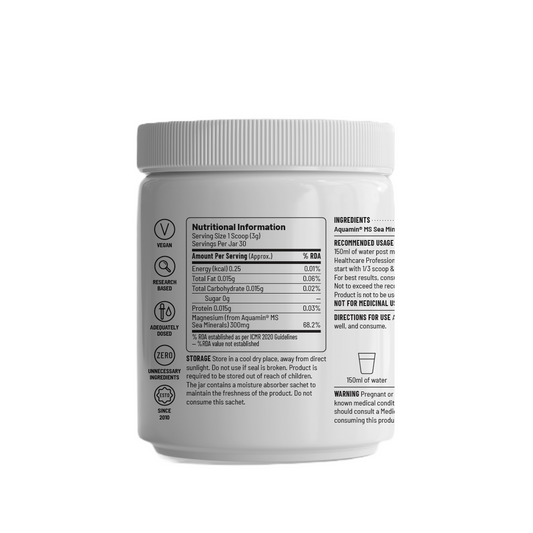Magnesium (Mg) is an essential mineral that plays a critical
role in energy metabolism, cell growth, glycolysis, and protein synthesis.
Magnesium is crucial for many physiological functions including nerve
conduction muscle contraction, blood pressure regulation [1], and sleep
regulation [5]. Exercise regulates Mg distribution and utilization and in
response to exercise, Mg is transported to locations where energy production is
taking place. For example, during long-term endurance exercise, serum Mg is likely
to shift from serum to erythrocytes or muscle to support exercise function [2].
Magnesium is also known to aid in muscle recovery from intense and strenuous
exercise [3]. Magnesium requirements are significantly higher in athletes than
in the sedentary population due to increased requirements during exercise and
other intense activities because a substantial amount of Mg is lost through
sweat [7]. High dietary fiber intake also reduces magnesium absorption in
athletes. Magnesium deficiency produces muscle weakness and damage which is
reflected by an increase in circulating muscle damage markers, compromising
subsequent recovery [3]. The maintenance of an adequate Mg status is therefore
of utmost importance for optimal exercise performance and recovery.
Our Formulation
Our Marine Magnesium is available in two variants, Capsule,
and Soluble powder.
The marine magnesium capsule variant contains 900mg Aquamin®
MS Sea Minerals of which Magnesium citrate is 90mg.
The marine magnesium power variant contains 3g Aquamin® MS
Sea Minerals of which Magnesium citrate is 300mg.
Mode of Action:
Glucose metabolism and glycolysis are key processes for
energy production during exercise. According to animal studies, Mg may
influence exercise performance via the glucose metabolic pathway. Energy
production depends upon cellular Mg status since Magnesium as Mg2+-ions binds
with ATP and forms the Mg2+-ATP complex which is the direct molecule used in
all physical activities. The process is impaired when there is insufficient Mg
supply. Mg is therefore essential in energy metabolism, cardiorespiratory function,
and muscle actions. Human studies indicate Mg supplementation may improve
performance parameters in both aerobic and anaerobic exercises [4]. Aside from being used up in the production of
energy, magnesium might also assist performance by reducing the accumulation of
lactic acid and reducing the perception of fatigue during strenuous exercise
through its action on the nervous system [1]. Magnesium may also play an
important role in sleep via regulation of the glutamatergic and GABA-ergic
systems by reducing the excitability of the nervous system. Furthermore,
studies indicate that magnesium status was highly correlated with sleep
duration [5, 6].
Magnesium helps maintain normal nerve and muscle function,
heart rhythm (cardiac excitability), vasomotor tone, blood pressure, immune
system, bone integrity, and blood glucose levels and promotes calcium
absorption. Because of magnesium's role in energy production and storage,
normal muscle function, and maintenance of blood glucose levels, it has been
studied as an ergogenic aid for athletes [2].
References:
1. Zhang Y, Xun P, Wang R, Mao L, He K. Can Magnesium
Enhance Exercise Performance? Nutrients. 2017 Aug 28;9(9):946. doi:
10.3390/nu9090946. PMID: 28846654; PMCID: PMC5622706.
2. Volpe SL. Magnesium and the Athlete. Curr Sports Med Rep.
2015 Jul-Aug;14(4):279-83. doi: 10.1249/JSR.0000000000000178. PMID: 26166051.
3. Córdova A, Mielgo-Ayuso J, Roche E, Caballero-García A,
Fernandez-Lázaro D. Impact of Magnesium Supplementation in Muscle Damage of
Professional Cyclists Competing in a Stage Race. Nutrients. 2019 Aug
16;11(8):1927. doi: 10.3390/nu11081927. PMID: 31426321; PMCID: PMC6723322.
4. Kass L.S., Skinner P., Poeira F. A pilot study on the
effects of magnesium supplementation with high and low habitual dietary
magnesium intake on resting and recovery from aerobic and resistance exercise
and systolic blood pressure. J. Sports Sci. Med. 2013;12:144–150
5. Zhang Y, Chen C, Lu L, Knutson KL, Carnethon MR, Fly AD,
Luo J, Haas DM, Shikany JM, Kahe K. Association of magnesium intake with sleep
duration and sleep quality: findings from the CARDIA study. Sleep. 2022 Apr
11;45(4):zsab276. doi: 10.1093/sleep/zsab276. PMID: 34883514; PMCID:
PMC8996025. <br> <br>
6. https://examine.com/summaries/study/0ea2o0/#ref-1
7. Nielsen FH, Lukaski HC. Update on the relationship
between magnesium and exercise. Magnes Res. 2006 Sep;19(3):180-9. PMID:
17172008.








 SaleVendor:Stress Relief
SaleVendor:Stress Relief








